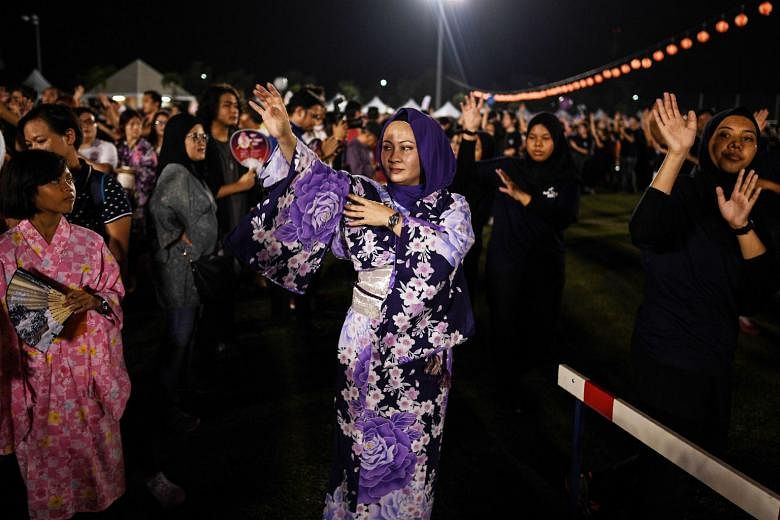The Sultan of Johor, Ibrahim Iskandar, recently condemned a laundrette in Muar for its "Muslim-only" services. He demanded its owner apologise and discontinue the discriminatory practice, which undermines his people's generally tolerant, harmonious and moderate outlook.
This is not the first time the Sultan has voiced his concerns regarding exclusivist attitudes. Previously, he cautioned the Malays not to imitate the Arabs by ignoring their cultural heritage. He had also asked the federal Islamic department Jakim to explain its overblown annual budget of RM1 billion (S$320 million).
Malaysia's Council of Rulers, which is made up of all nine sultans in the country, echoed the Sultan of Johor's unease, urging Malaysians to uphold the country's cherished multicultural, inclusive and tolerant values.
Many applauded the Malay rulers' intervention. To have a group with such royal stature rejecting exclusivism will definitely put the brakes on divisive behaviour of certain religious elites. The rulers are the heads of Islam in their respective states and they have authority over appointments in religious councils and departments. The rulers also determine who becomes the mufti (chief religious scholar) of each state and whether fatwas (religious rulings) can be enforced.
Yet, to develop a more inclusive society, a top-down intervention would not suffice without grassroots support. We do not want Muslims to tolerate non-Muslims (and vice versa) because of their fear of the law, or because their leaders said so, but because they truly understand the essence of upholding diversity and freedom found in Islam. Thus, society should also give the intellectuals and activists the space to develop critical ideas.
Restricting grassroots intellectual inputs means shutting the doors to progress, as society is exposed only to ideas promoted by those in power whom they are familiar with.
Society must be aware that there are groups promoting ideas that are relevant for modern needs. Ideas associated with laws, governance and the economy have to evolve to meet the contemporary context of a multiracial and multi-religious Malaysia. Dichotomising Islamic ideas from non-Islamic ones is no longer the right approach in this modern day and age when Muslims and non-Muslims live alongside one another, abiding by the social contract embodied in the modern-day Constitution.
Unfortunately, such progressive ideas that are relevant to the times we live in are being silenced.

The way that groups promoting alternative views have been treated of late is a cause for concern. The Home Affairs Ministry has banned several books including one by G25, a group initiated by 25 prominent Malays (mostly former senior civil servants).
The banned book, Breaking The Silence - Voices Of Moderation: Islam In A Constitutional Democracy, was characterised as a "threat" to public order, even though the book's contributors include internationally renowned academics, activists and Islamic scholars. The book is mainly arguing for Islam's place in the Malaysian Constitution.
Civil society groups have also been told to toe the line. Women's rights group Sisters in Islam is facing a legal battle to reverse an edict issued by the Selangor Islamic Religious Council declaring the organisation "deviant".
Recently, Dr Ahmad Farouk Musa, the head of another organisation with progressive views, the Islamic Renaissance Front (IRF), was questioned by the Federal Territories Religious Department for organising a talk by Turkish intellectual and writer Mustafa Akyol. The IRF had invited Mr Akyol to speak on freedom of conscience, but it was stopped because he had not attained proper accreditation from the religious authorities in Malaysia.
In the same vein, novelist and academic Mohd Faisal Musa had had many of his books banned, again for promoting ideas which the religious authorities are not comfortable with.
As we laud the Malay rulers' check on the religious elites, it is also important that Malaysian elites allow intellectual discourse to develop from the ground up. This will enrich society with progressive ideas, allowing people to compare these ideas with intellectual developments from the West and the region, and broaden their minds to look beyond books they are familiar with.
For instance, to ascertain whether Islam is in sync with democracy, some political activists refer only to writings of Muslim thinkers from the Middle East, such as Tunisia and Egypt, declaring Western contributions as secular and not in line with Islamic traditions. The need to refer to Muslim scholars in the Middle East for such justification is puzzling, when Muslim thinkers in Indonesia and Malaysia have for decades participated in the electoral process, embracing democracy and considering it in line with Islamic principles. The way the democratic process is operationalised is open for debate, of course. This mode of thinking is certainly the work of an exclusivist mind.
In fact, many revivalist Muslims today believe there is a pristine Islamic system that is far superior to modern-day democracies. Such a dichotomy only feeds into the notion of Islamic and non-Islamic systems, with the more extreme forms taking the form of Islamic caliphate, and the implementation of hudud laws (punitive Islamic laws which include punishments such as amputation, stoning and whipping).
It is also worrying that the push to enhance ACT 355 Syariah Courts (Criminal Jurisdiction Act 1965) by Parti Islam SeMalaysia and Umno leaders may further deepen the Muslim and non-Muslim divide.
Going forward, Malaysia's political elites should emulate the leadership of their Malay rulers by speaking up against divisive ideas. They must also lead by example by participating in civil politicking, and thwarting the growing resentment between Muslims and non-Muslims in the country.
- The writer is a fellow at ISEAS - Yusof Ishak Institute. He is also an adjunct lecturer at the Department of Malay Studies, National University of Singapore.

